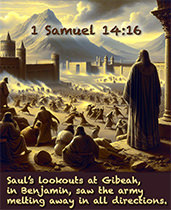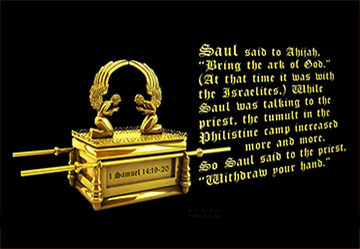1 Samuel 14:15–52 . . . Bible Study Summary with Videos and Questions
“Israel Pursues the Panic-Stricken Philistines”
Looking back, in spite of King Saul having crushed the Ammonites in a most hearty manner, he seemed determined not to trouble the waters with the Philistines who occupied Israel. Their domination of the people of God was evident in various ways. Philistine garrisons were stationed in the land (see 10:5; 13:3) and the Israelites were severely restricted in their possession and use of Iron-Age technology: They could be blacksmiths, but they were prohibited from possessing swords and other iron weapons; they paid dearly to use iron farming tools (13:19–23). In spite of the Philistines’ oppression of Israel, and in spite of King Saul's divine enablement (see chapters 9 and 10), Saul chose to send home the 330,000 troops who'd assembled to free the citizens of Jabesh, Gilead. He kept only a bare-bones army of 3,000 men, perhaps intending to maintain the status quo with the Philistines.
Unwilling to let this situation stand, Jonathan, with his 1,000 men, attacked the Philistine garrison at Geba (13:3), bringing about a massive Philistine counter-attack (13:5). Saul had no choice but to summon the Israelites to war, though only a small number reported for duty, many of whom deserted when they realized the hopelessness of Israel’s situation. Some fled from Saul to hide themselves from the Philistines while others became turncoats and joined the Philistines (13:6; 14:21–22). Saul summoned the troops to Gilgal, seemingly as Samuel had instructed (10:8). But when it appeared that Samuel wouldn't arrive within the appointed time, Saul offered burnt offerings. Samuel arrived as soon as these offerings were made; he rebuked Saul for his disobedience, indicating that that would cost him an enduring kingdom (13:11–14).
If Saul wasn't inclined to take the initiative to fight the Philistines, Jonathan was. We saw in last week's summary of 1 Samuel 14:1–14 that he and his armor bearer secretly set out to engage the Philistines. They climbed down one sharp crag and scaled up the other side, once the Philistine response to their presence indicated that God would give Israel the victory. When the two gallant Israelites reached the top, they killed all 20 of them within a half acre. At this stage of the fighting, God intervened divinely by causing an awesome earthquake, one that melted the Philistines' fortitude and numbers. Today's focus and discussion start at the onset of this earthquake.
[Note: Click the link to This Week’s Passage near the bottom of this page to read today’s Scripture.]
“Stop Seeking an Answer from God” (14:15–23)
Jonathan and his armor bearer had done their part. God would next do his part by causing the ground to shake (v. 15). Saul's lookouts saw the Philistine "army melting away in all directions" (v. 16). So Saul called for the mustering of forces, which determined that Jonathan and his armor-bearer were AWOL. Saul called the roll, instead of fighting the Philistines at that strategic moment. He was probably worried about who was leading the battle and who'd get the credit.
When the roll was called, Saul wasn't surprised; the results were exactly as he'd feared. Everything had been going well enough with the Philistines (by his standards), until Jonathan messed up everything by attacking the Philistine garrison at Geba (13:3). This whole disaster (in Saul's eyes) with the massive buildup of Philistine soldiers at Mikmash was Jonathan’s fault. Unable to leave well enough alone, as both armies were encamped against each other, Saul avoided taking further action, having sat under that pomegranate tree (14:2), when a major disturbance among the Philistines arose. Something had to have caused this commotion. Saul didn't first think of God; he instead thought of his trouble-making son, Jonathan. By mustering the troops, he was able to find out who wasn't among them and thus deduce who'd caused him all this trouble — again.
18Saul said to Ahijah, “Bring the ark of God.” (At that time it was with the Israelites.) 19While Saul was talking to the priest, the tumult in the Philistine camp increased more and more. So Saul said to the priest, “Withdraw your hand” (1 Sam. 14:18).
Saul then ordered that the ark of God be brought to him. But why? He was probably trying to look spiritual here, since the ark was the sacred box that documented God’s covenant or relationship with Israel. He was trying to force God to act, because the sacred ark that was to arrive would have been in danger during a battle. It would have taken a whole day to bring the ark from Kiriath Jearim (7:1), but he couldn't wait that long; he had to act quickly. There was a time for him to step aside and pray, and there was a time to get his sword and fight. Sadly, Saul didn't know what time it was! Neither had he realized what he was to do. His insecurity, fear, and self-focus had paralyzed him. It was definitely time to fight. So he changed his mind about the ark and sent his soldiers into the battle (v. 20). He told the priest "Withdraw your hand," which means, "Stop seeking an answer from God by using the Urim and Thummim," both of which were gemstones, used to determine God's will, which were kept in a priest's breastplate pouch (detailed in 14:41).
Saul and his men went after the panic-smitten Philistines, who, in their confusion, were killing each other. As the Israelite soldiers drew near them, they could see clearly the victory that God had brought about for them. The Israelite warriors battled against the Philistines. Jonathan and his armor bearer led the charge; Saul rather reluctantly followed, once a victory had been assured. Joining with Saul and his 600 men were those who'd deserted the ranks of Saul’s army and sold their services to the Philistines (14:21). When those who'd fled from Saul and hid themselves in the hills saw the Philistine defeat and retreat, "they joined the battle in hot pursuit" (v. 22) and multiplied his forces that day.
Saul’s Honey-Covered Oath (vv. 24–30)
Jonathan, boldly trusting the LORD, had just struck a mighty blow against the Philistines. God had totally routed and confused the Philistine army. It was the job of Israel's army, under King Saul, to finish the job by striking down the confused, fleeing Philistine army. It was on this day of battle against the Philistines that Saul declared a curse. Israel's victory over the Philistines could have been much more compelling and decisive. The Israelite soldiers were hard-pressed that day, unable to pursue and destroy more Philistines. The man most responsible for Israel’s inability was none other than King Saul. It was his foolishly declared oath that hindered the Israelite soldiers.
Saul's desire wasn't to glorify God; it was to glorify himself. The focus here wasn't on the LORD but on Saul's commanded fast. The honey found on the ground (v. 25) was provision from God! The Israeli army was hot on the pursuit of the fleeing Philistines. But they were tired and hungry. They needed energy to continue the pursuit and finish the battle. A taste of that honey would have given the soldiers the kind of sugar-rush energy they needed to carry on the battle.
Saul's fight with the Philistines became personal. It wasn't God’s battle or even Israel’s battle; it was his battle and his victory. So he put his men under an oath: “Cursed be anyone who eats food before evening comes" (v. 24). As a result, his men were to fight on an empty stomach. He perhaps reasoned that his soldiers' fasting would avoid wasting valuable time by stopping to prepare and eat a meal. There were no ready rations for his men to eat on the run, or so it appeared to Saul. So he forbade his men to eat all day long, forcing them to fight the entire day without nourishment, which they did (v. 26).
27But Jonathan had not heard that his father had bound the people with the oath, so he reached out the end of the staff that was in his hand and dipped it into the honeycomb. He raised his hand to his mouth, and his eyes brightened. 28Then one of the soldiers told him, “Your father bound the army under a strict oath, saying, ‘Cursed be anyone who eats food today!’ That is why the men are faint” (1 Sam. 14:27–28).
Verses 24 and 28 reveal Saul's declaration: "Cursed be anyone." Since when did he receive the authority to proclaim such a curse? Had he somehow become the nation's spiritual leader that Prophet Samuel had been? If he wanted to call for a voluntary fast, that would have been fine. But instead of leading by example and inviting the army of Israel to follow him, he placed his people under a strict oath. No matter his motive, it was a foolish thing to have done. On battle day, when Israel's morale and physical energy level should have been the highest, the soldiers of Israel were distressed. None of the soldiers ate food; they were weak and discouraged on a day when they should have been strong and enthusiastic.
At least five key themes and events are found in vv. 27–29: (1) Jonathan's unknowing transgression, (2) Saul's rash and foolish oath, (3) Jonathan's condemnation of Saul's actions, (4) The contrast between Jonathan and Saul, and (5) setting the stage for conflict. This pivotal moment underscores the consequences of Saul's poor leadership while highlighting Jonathan's integrity and wisdom. Jonathan ate some of that honey. Immediately, "his eyes brightened" (v. 27). He needed the energy to fight, and God provided it. Perhaps Jonathan shouldn't have said next, “My father has made trouble for the country" (v. 29). The troops sensed that he was undercutting his father's authority. It would have been better to have spoken to his father directly. However, despite all that, Jonathan was exactly right! King Saul had indeed troubled the land with his pseudo-spiritual command to fast. Their victory could have been greater, had the people eaten on a day when they should have been strong.
Israel’s Soldiers Sin because of Saul (vv. 31–39)
We see in this five-verse passage that it was bad enough when Saul’s foolishness kept the Israelites from winning decisively, but it was inexcusable when his order resulted in sinning. Obediently, the Israelites complied with Saul’s senseless order not to eat until evening. Due to fatigue, fewer Philistines were killed. As the day came to a close, the people were famished when they come upon the cattle left behind by their enemies. Sadly, the hungry soldiers devoured the livestock without proper preparation; doing so, they sinned according to the Law (Leviticus 17:10; 19:26a). God specifically commanded Israel to always properly drain the blood from an animal before they butchered it. Because of Saul's foolish command, the people were so hungry that they broke this command. Their obedience to Saul's foolish command led them to disobey God's clearly declared command.
When Saul said, “Roll a large stone over here at once" (v. 33), he'd set up a stone to properly butcher the animals and built an altar to the LORD; at least he'd done something right after he'd done wrong. But, in response to God's silence, Saul made another foolish oath! He was about to plunder the Philistines that night, but the priest said, "Let us inquire of God here." So Saul asked God what he should do. But God didn't respond that day (v. 37). Saul was convinced that there was sin among the people, instead of in himself. So sure of being right he pronounced another oath: "As surely as the Lord who rescues Israel lives, even if the guilt lies with my son Jonathan, he must die" (v. 39).
Of course, if Saul knew that it was Jonathan who'd violated his first oath, he'd never have said that. But he was so caught up in being right that he added this new foolish vow to his previous foolish commandment. The people knew that he'd eaten honey and of Saul's death sentence for anyone who'd eaten; yet, everyone loved and respected Jonathan, and they knew that Saul was in the wrong. Not one of them said a word (v. 39).
From Blame to Benediction (vv. 40–52)
Saul and Jonathan were set off against the rest of the soldiers. Not surprisingly, both were selected. Then Saul had the lot cast between Jonathan and himself and Jonathan was indicted. The people acquiesced in this process, at least for the moment (see v. 40). Who'd oppose Saul in his state of mind? When Jonathan was called by the casting of lots, his father asked him what he'd done. He confessed that he'd indeed tasted a little honey with the end of his staff. Saul seemed to have felt it better to kill his son than admit his own sin and foolishness.
Jonathan made no excuses and didn't indict his father, foolish though he was. He placed his life in his father's hands, the king's. The people who'd quietly put up with all the king’s dramatics had had enough. They weren't willing to allow Saul to put his son to death, since Jonathan, not Saul, brought about a great deliverance for them (v. 45). The battle was over, but the war wasn't. The Philistines suffered a great loss but not a total defeat. The closing verses sum up Saul's apparent successes and list his descendants. We might, therefore, sense something of a benediction, with respect to Saul’s life and reign as king of Israel.
† Summary of 1 Samuel 14:15–52
Today’s passage recounts a dramatic turn in Israel’s conflict with the Philistines, highlighting God’s intervention and significant events that test Saul’s leadership. Following Jonathan’s daring attack, panic sent by God spreads among the Philistines, shaking their camp and the surrounding land (14:15). Observing the chaos from afar, Saul rallies his scattered troops and joins the battle. As Israel pursues the Philistines, Saul imposes a rash oath that his soldiers must not eat until evening, seeking to maximize victory — a command that weakens the army (vv. 16–24). Jonathan, unaware of his father’s vow, eats some honey, renewing his strength; later, the people inform him of the oath, and he questions the wisdom of Saul’s actions (vv. 25–30).
As evening falls, the famished Israelites pounce on plunder, slaughtering and eating animals with the blood, breaking God’s commands (vv. 31–34). Saul builds an altar and seeks God’s guidance for further pursuit, but receives no answer, suspecting sin in the camp. By casting lots, Jonathan is identified as the one who unintentionally broke the oath. Although Saul is prepared to execute him, the people intervene, acknowledging Jonathan’s role in Israel’s victory and rescuing him (vv. 35–45). The chapter closes by summarizing Saul’s reign — his battles, leadership, and family, and his continual warfare against Israel’s enemies, including the Philistines (vv. 46–52).
Key points with verse references:
• A God-sent panic spreads among the Philistines after Jonathan’s attack, causing confusion and resulting in a decisive victory as Saul rallies the Israelites (vv. 15–23).
• Saul’s rash oath forbids his troops from eating until evening, weakening them and nearly undermining their pursuit (vv. 24–30).
• Jonathan unknowingly violates the oath, in their hunger, by eating honey, leading to a crisis when Saul seeks to identify the cause of God’s silence (vv. 27–30, 37–42).
• The people break God’s command by eating meat with blood in their hunger, prompting Saul to intervene and build an altar (vv. 31–35).
• Saul’s leadership is tested as he nearly executes Jonathan for breaking the oath, but the people save Jonathan, affirming his role and sparing his life (vv. 43–45); the chapter ends with a summary of Saul’s reign and persistent warfare (vv. 46–52).
This Week's Passage
1 Samuel 14:15–52
New International Version (NIV) [View it in a different version by clicking here; also listen to chapter 14 narrated by Max McLean].
† Summary Video: “The First Book of Samuel”
† Watch this introductory video clip created by BibleProject on bibleproject.com.
- Q. Why did Saul make his vow (v. 39)? What does his response in v. 44 show?





